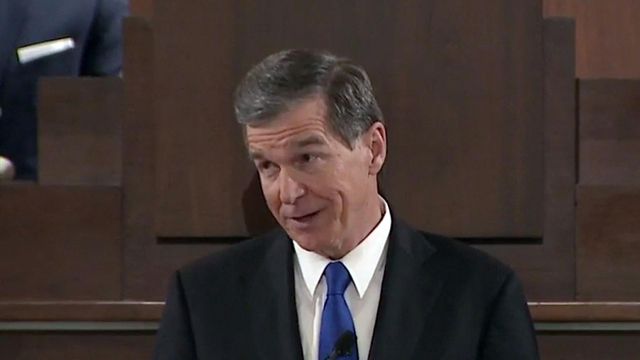Editorial: Cooper's State of the State offers needed common sense priorities
Tuesday, Feb. 26, 2019 -- Legislative leaders may want to quibble over the implementation details but there should not be any disagreement with the priorities Gov. Roy Cooper laid out in his State of the State address. "Insist our public schools come first. ... Create opportunities for our cities and rural communities. ... Get health care for hundreds of thousands of working people with no insurance."
Posted — Updated- “Insist our public schools come first. …
- “Create opportunities for our cities and rural communities. …
- "Get health care for hundreds of thousands of working people with no insurance.”
Cooper, a Democrat, drew the obvious conclusion from the results of the election three months ago where, in the face of heavily gerrymandered congressional and legislative districts, Republicans lost their veto-proof majorities in both houses of the General Assembly.
That doesn’t mean legislators have to acquiesce to Cooper’s priorities. Nor does it mean that it’s got to be the way Senate Leader Phil Berger or House Speaker Tim Moore demand.
The governor pointed out it does mean, as our citizens and even legislators showed in the face violent storms, the cooperation habit needs to carry over to all other areas of governing.
Cooper was on the mark when he said “public schools have a taken a back seat to tax breaks for those at the very top.” A quality education for every child, as our state constitution demands, requires adequate funding. Money needed for student learning shouldn’t be given away in corporate tax cuts that aren’t necessary.
Providing bonds for much-needed public school construction and renovations; tuition-free community colleges, improving educator pay are not matters of debate. Quibbling over details must not prevent these needs from being met.
Closely tied to education opportunity, Cooper noted, is the need for all areas of the state to have the kind of internet that bridges the digital divide. Fostering public-private partnerships can be used so this critical infrastructure doesn’t bypass rural areas where too many businesses and homes lack high speed connectivity.
As he talked of protecting North Carolina’s environment – from opposing offshore drilling; assuring safe storage of coal ash, stopping chemical pollution in the Cape Fear River to promoting clean energy jobs – Cooper promised to fight to expand Medicaid to about a half-million citizens who lack health coverage.
“Many North Carolinians are tired of their tax dollars going to Washington to cover people in other states but not our state,” he pointed out.
In the coming weeks and months, Cooper’s and Berger’s comments offer a stark contrast. Will Republican legislators, as Berger clearly stressed, demand that their ways are the only ways?
Or, will confrontation give way to Cooper’s call for cooperation?
“We have broad agreement on what we want for our state. We sometimes differ on how to achieve it. But let’s debate in good faith, not with political stunts. In the open, not behind closed doors. With respect for those who disagree, not disdain.”
It’s time for Berger and his colleagues to give it a try. North Carolina voters are going to closely watch this legislative session and 2020 is not that far away.
Copyright 2024 by Capitol Broadcasting Company. All rights reserved. This material may not be published, broadcast, rewritten or redistributed.





